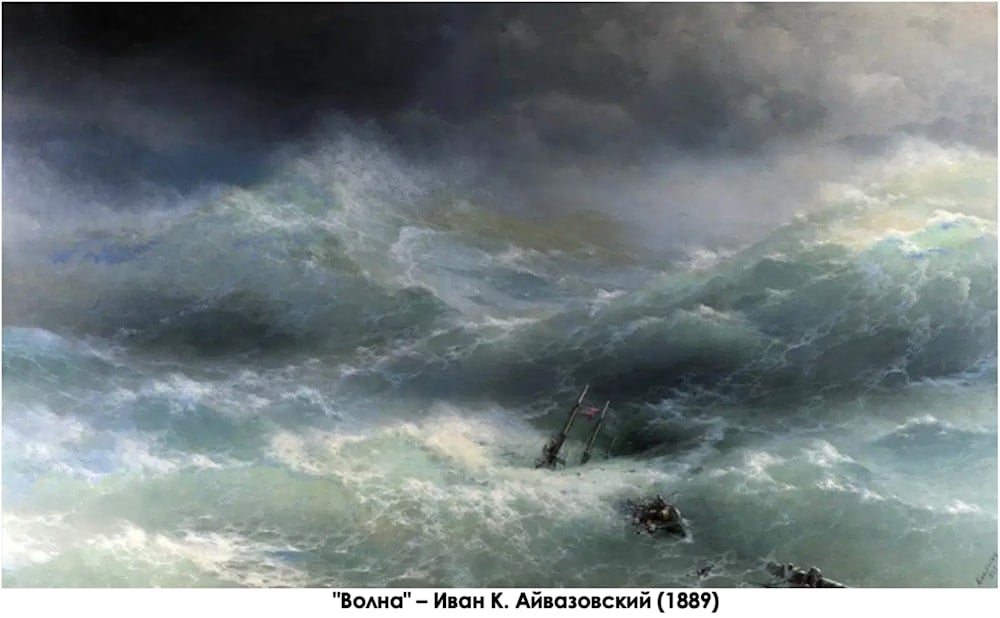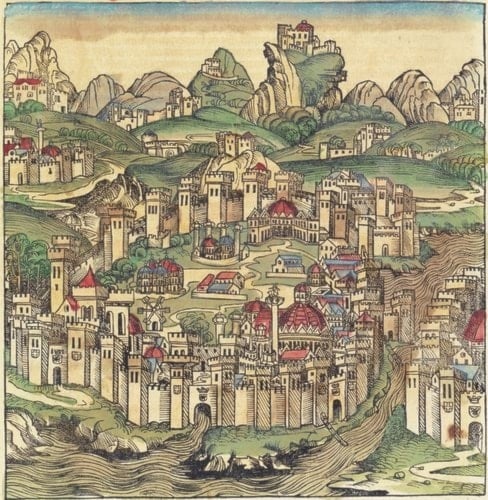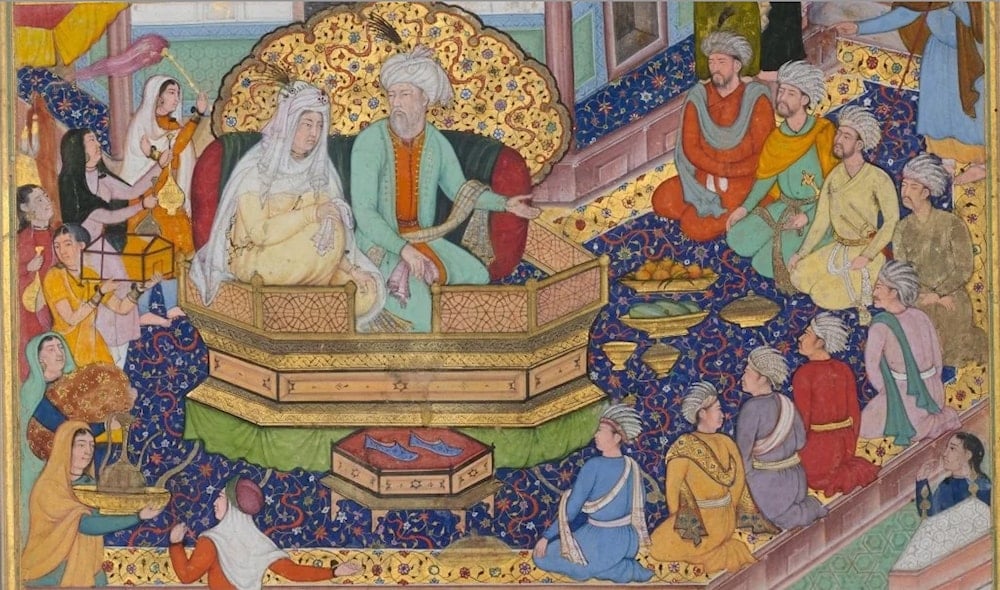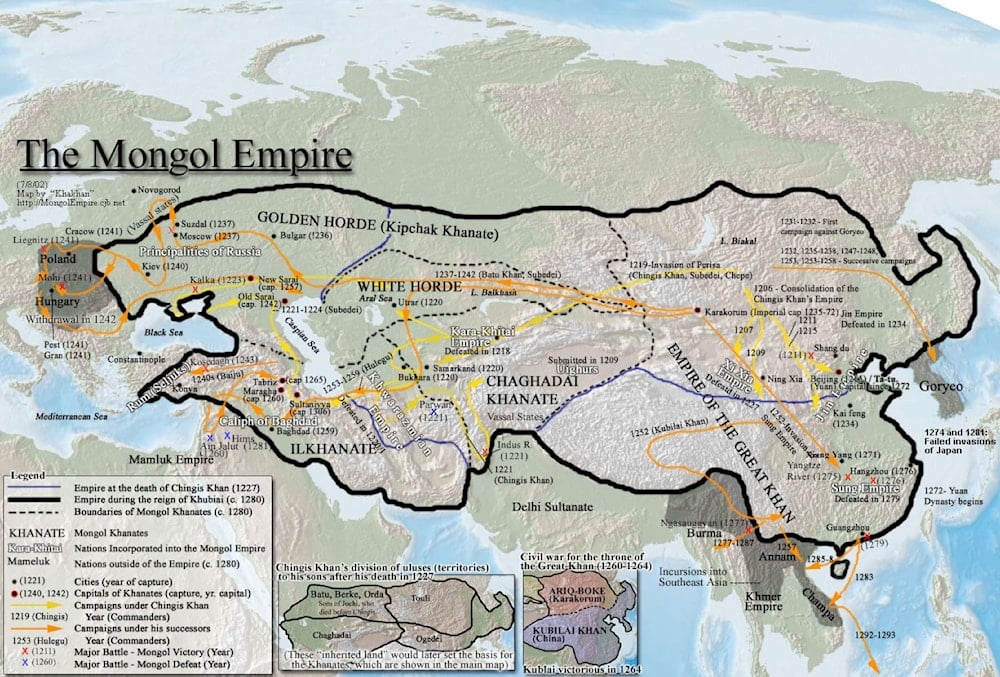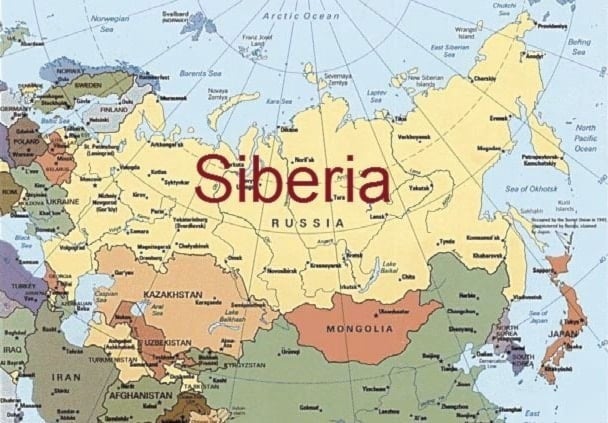Navigating the Fog: An Interview with Professor Sergei A. Karaganov
Tariq Marzbaan and Nora Hoppe hold another interview with Professor Sergei Karaganov, discussing the developments in Russia and the world, especially with the nuclear threat growing evermore present.
-

"We are turning back home, where we have been. And turning back home is, of course, returning to the East and to the South. In terms of our internal, cultural, spiritual, economic and political movement, it is a movement towards Siberia." (Al Mayadeen English; Illustrated by Zeinab El-Hajj)
As we transition from a dying world to a new one in its turbulent birth pangs – we find ourselves in a foggy interregnum that urgently needs more clarity for us to move on.
We turn once again to political scientist and senior political advisor, Professor Sergei A. Karaganov* – someone who has a long, illustrious career and who continues to hold many posts, amongst them: Honorary Chairman of the Council for Foreign and Defence Policy (Russia's leading public foreign policy organisation) and academic supervisor of the Faculty of World Economics and World Politics of the National Research University Higher School of Economics in Moscow – as he has long been offering insightful views on such topics as the use of nuclear deterrence as a wake-up call to the West to restore common sense, and Russia's continuing pivot away from the West to the East and the South.
* * *
HOPPE / MARZBAAN: In your recent book from "Restraining to Deterring" – written together with Professor Trenin and Admiral Avakyants, you stressed the need for a new strategic security plan for Russia against the ever-growing menaces from the West, which appear in various forms. One of the things you and your colleagues recommend is the need to revive the fear of nuclear weapons.
And outgoing chief of NATO's military committee, Admiral Rob Bauer, admitted that NATO would not be able to deploy their troops on the ground in Ukraine because of Russia's arsenal of nuclear weapons. But now with this latest escalation, in which the US is allowing Ukraine to use American ATACMS ballistic missiles to strike deep into Russian territory, such strikes would constitute a direct NATO attack on the Russian Federation.
What might be the Russian response? You outlined several military steps and measures in your book as responses to attacks by the adversaries, but what measures could be taken against these ATACMS strikes on Russian territory.
PROF. KARAGANOV: I do not want to impinge on my colleagues and fellows in the high command of the Russian army and political circles. So, I will offer my personal view.
This is a provocation, which should and could be answered very directly. Of course, by an avalanche of attacks on high-value targets in Ukraine. And there already are good targets in Romania and Poland, with the threat of a second or third wave, using nuclear weapons.
Russia already sent a powerful signal by a live testing of the new hypersonic multiple independently targetable re-entry vehicle, the "Oreshnik" missile, against military-industrial targets in Ukraine. If the West does not stop its aggression, missiles will be tested against targets supporting the Kiev regime. President Putin said that if these missiles were to be used, we would warn civilians beforehand, so they could leave the areas or countries against which warheads would be used. I had advised such a warning to be used for humanitarian reasons, but also to strengthen deterrence against the Western elites, who seem to have lost minds. The total payload of the "Oreshnik" missile with six nuclear warheads is close to one megaton. But, I repeat, God forbid… I hope Western elites could sober up before that.
At this juncture, I would not recommend a strike against targets in Europe. Because it looks like a provocation from the Biden administration, which wants to leave a war of a higher level in the hands of the Trump administration. So, in spite of the fact that I'm always very harsh, I would this time advise caution.
HOPPE / MARZBAAN: How else can Russia "sober up" their comatose and psychopathic adversaries? Is there any other way to avoid a nuclear confrontation and WW3?
PROF. KARAGANOV: Unfortunately, we are dealing with an elite, who has lost all sense and reason and also a fear of war. And they are – especially in Europe – pushing their populations and countries into a meat-grinding machine, just as they had pushed Ukraine. So non-nuclear deterrents could be used and should be used. But the main thing is to restore nuclear deterrence, the fear of a nuclear holocaust – a holocaust in the grand sense of the word. And for that, we have all to think about nuclear weapons seriously and about the war seriously. Unfortunately, because of 70 years of relative peace – though of course there were Vietnams, there were Iraqs, there were Afghanistans, etc. – people all over the world, and especially in the West, got themselves used to relative peace and stability. I call it "strategic parasitism".
But I hope that a fear of nuclear weapons and deterrence would be restored without the use of nuclear weapons – beforehand. If we do not restore this fear, the world is virtually doomed to a Third World War and a massive use of these and other weapons, destroying existing civilizations and taking away hundreds of millions of lives. The lives of survivors would be hellish for decades if not centuries. Many would envy the dead. To avoid that, we have to discuss the matter much more seriously than we used to. Thank God – since people like myself started a year and a half ago – a debate about the role of nuclear weapons has been reignited in our international relations. It has become a much more debated subject now. It is a good sign.
The strengthening of nuclear deterrence in Russian policies has two aims: One is to win the war in Ukraine, without sacrificing too many of our best men; and, second, to prevent a Third World War, which is advancing. The third task is to stop the West from regaining its positions, which it held in the world for the last five centuries, which permitted it to suppress other civilisations and to siphon off the world's GNP from other peoples.
We hope, and it is my hope, that our victory in Ukraine can be a substitution for a Third World War.
HOPPE / MARZBAAN: Yes, we hope so too. And they are obviously losing in Ukraine.
But the West will seek other fronts. And you wrote that, even after Russia has won the war in Ukraine, the confrontation with the collective West will continue.
The intentions and plans of the West, especially on the part of the US neocons, have been known for a long time. The adherents to Mackinder's Heartland Theory, to Brzezinski, the PNAC, the Rand Corporation, George Friedman of Stratfor and others, they have spoken openly about their agenda for Eurasia…
Which regions do you see as most threatened in the near future? How do you see the developments in West Asia and Central Asia? And what about the potential for more colour revolutions?
PROF. KARAGANOV: Well, there could still be colour revolutions. They are trying this technique here and there… in Georgia, Armenia, again in Syria, Bangladesh, etc. But these are residual battles. They are in retreat, and we are witnessing a very vicious and desperate counter-attack.
I think the aim of Russia and our international partners is to channel our Western enemies - hopefully future partners - into a much more sober mood.
I think that the United States could be channelled to retreat into a position of a "normal great power", one of the four future leaders of the new world order of 20 years from now.
European elites, who have completely lost their strategic mind and common sense should be, for the time being, just pushed aside. They are, from my point of view, unfortunately desperately useless and dangerous. But, of course, over the next 10 to 15 years, we will have to restore some relations with some European countries under the auspices of the Greater Eurasian Project, which we have been promoting.
But at this juncture, the main task is deterrence. And "sobering up".
HOPPE / MARZBAAN: In your very enlightening book, you speak of a "flexible coalition strategy" as another element of strategic defence. "An expanded strategic partnership between Russia and China will serve as the core of such a coalition framework."
Which other countries are joining this coalition? Can you please describe this coalition strategy briefly?
PROF. KARAGANOV: At this juncture there is Russia, China, Iran, North Korea… But, generally speaking, there is a much wider potential coalition of those countries who'd love to be freed from the Western yoke. But they are now fluctuating, because they have been integrated in the previous system. They have very strong comprador elements in their elites, but that is understandable. But in principle, if and when Russia wins, more and more countries will come to our side. That is a very clear aim of our policies, as well as the aim for the betterment of humanity.
We are not pursuing policies, which are anti-Western. We are pursuing policies for a better world which is free, multi-coloured, multi-cultural and multi-political. I would love to live in that world. Though I am relatively old and probably will not see the coming of this world. But I am happy to work for that coming.
And also, as I have written in many of my articles, Russia – with its unique cultural, religious and racial openness – is very much better prepared for this kind of world than most of the countries on Earth. So, we are looking for that world, and we are working to make this happen.
HOPPE / MARZBAAN: But in the case they launch a real major war between Russia and NATO, are there countries or states that will join the Russian coalition in the war directly?
PROF. KARAGANOV: Well, we do not need any countries to join us in a coalition in a war with NATO, which I hope would not happen. There is, of course, a great ally, which is [Belarus].
If a war with NATO starts, it will immediately become nuclear. And Europe (outside of Russia) would be largely finished. Unfortunately, people lost their understanding of that simple truth. I repeat: any war between Russia and NATO would go nuclear. And, as I have said many times, the U.S. would not enter this war with nuclear weapons. Unless, of course, a bunch of madmen and America-haters occupy the White House and the Pentagon simultaneously. But the victory of Trump with all his kinkiness, offers the hope that he will not follow the current European path. Though Trump is not a friend of Russia and of all peace-loving peoples. But he is a signal of a return of the U.S. to sanity.
So I hope that a war between Russian and NATO will never happen. Even though Russia is bound to win, it would be a Pyrrhic victory. We would have to destroy a part of our Russian civilisation, a part of ourselves.
HOPPE / MARZBAAN: Do you see the war in West Asia against Palestine, Lebanon, Syria, with its escalations against Iran, as part of the same war against Russia, against the BRICS, against the West, against the Rest?
PROF. KARAGANOV: There will be many tensions. I mean, they will come not only because the West is on the counter attack against the Rest. First of all, their target number one is Russia. Their chief target is China. The West will not win. But the causes of these tensions are manifold and still to come. There are other nations, other leaders of resurrecting countries of the World Majority, of the Global South, which would start to compete with each other. But I think that, if we stay on the straight course, things will go in the right direction. And I'm very optimistic. Of course, we have to avoid a Third World War, which is the most important subject on the agenda of Russia, and, hopefully, all other countries.
HOPPE / MARZBAAN: Can you explain to our readers how the Soviet Union then and Russia now has helped the decolonisation of many states of the Global Majority, has helped these states become more politically and ideologically independent by destroying the West nuclear power monopoly, and by having a political and ideological weight in the world?
PROF. KARAGANOV: Until the 16th century, the world was multipolar. There were many civilisations… They were not as interconnected and interdependent as they are now, but there were many civilisations and centres of power. And most of the great civilisations were outside of the Western end of the Eurasian Peninsula.
But then, because Europe was in a condensed, constantly fighting region of the world, Europeans developed a better use of cannons and a better military organisation, and started to conquer the world. And that started in the 16th century, and continued on into the 19th century with the epoch of colonisation. Then that epoch started to collapse in the early 20th century when the Soviet Union broke out of the system, and immediately started to support those nations that wanted to decolonise themselves. But still it was a side track. And then something very important happened, and that is Russia, the Soviet Union, acquired nuclear weapons and undermined the military preponderance - the foundation of Western dominance in cultural, political affairs, economics - the system, which allowed the West to siphon off the world's GNP in its own favour. The relative wealth of the West now is, of course, not only, but largely, based on the fact that it has been able for several centuries to siphon off world wealth from other nations or their GNP by imposing its rules, culture, economic policies and political institutions.
That process started to be undermined when the Soviet Union acquired "material parity". Then for 15 years, the Soviet Union, for its own reasons, collapsed. And it seemed that the world returned back to colonial and neo-colonial times. But now we have resumed our role as the "liberator of the world."
I am happy to be a member of the intelligentsia, a citizen, of a country that is the liberator of humanity. We have supported decolonisation. We are now supporting the liberation of the world from the Western yoke.
HOPPE / MARZBAAN: Russia is said to be turning away from the West and orientating itself toward the East. Which East is implied here? Siberia, China, the Asian World, the World Majority, or all of them.
PROF. KARAGANOV: Sooner or later, we will restore some of our relations with the West, all the more with the culture – as we are largely a European country. Of course, with very special traits. And we do not share current post-European and post-human values. But politically and socially, we are more Asian.
We are the proud heirs of two great civilisations: one was Mongol and the second was Byzantine. Byzantium was, as we know, destroyed by hungry and barbaric crusaders.
At that time, it was one of the most flourishing civilisations in the world. It is from there that we got our religion and our faith. The Mongols robbed our country, but also they brought the culture of "vertical power." And also, this unbelievable sense of – I would say – of "global thinking". So Russians, in spite of the fact that they suffered, they also inherited some of the best traits of the Mongol Genghis Khan Empire.
So we are turning back to where we have been returned from a great journey, which was started by Peter the Great to Europe. It was very useful, because we have culturally enriched ourselves - to the extent that, we have created one of the best, or probably the best literature in the world and great art. Now we are saying: no, thank you, not anymore. We have exhausted the usefulness of our European journey.
So we are turning back home, where we have been. And turning back home is, of course, returning to the East and to the South. In terms of our internal, cultural, spiritual, economic and political movement, it is a movement towards Siberia. But in terms of our external orientation, it is bettering our relations with countries of the Global South and East.
We have become the pinnacle of, or maybe the hard core, strategic linchpin of influence for the Global South. We call it the "Global Majority". Of course, we are not a southern country. So we call ourselves, refer to ourselves, as Northern Eurasia – a balance of the world and Greater Eurasia.
HOPPE / MARZBAAN: Russia's orientation away from the West towards the East will apparently not only be seen in terms of economic, scientific, and technological development and security, as you said, but a quest for a new non-Western worldview, a new Weltanschauung.
But as modernity, the modern age of the entire planet has been shaped by the West and is already here, how can we develop it further in a civilised non-Western manner?
PROF. KARAGANOV: The West has reached and passed its pinnacle, has left its place as a source of modernity. It is a source of moral, political, economic, and – sooner or later – economic degradation. So the sooner we part from the West – but keeping our Western roots, especially in our culture – the better. The West is not a source of economic, political or social progress anymore. As I'm saying to my compatriots… being a "Westernizer" and a Western centrist in our case – or in the case of any other country – is a sign of stupidity and intellectual backwardness.
HOPPE / MARZBAAN: You wrote in your book, "From Restraining to Deterring", that Russia needs a new Russian civilisational platform. Could you please describe that?
PROF. KARAGANOV: Well, we're working on several subjects, one of them is on a new ideology for Russia. It is too complicated an issue to discuss in one interview. We would need a series for that. I love this subject, but if I start, it will be so piecemeal that people wouldn't understand, so we would waste time.
HOPPE / MARZBAAN: Yes, but maybe we can do that for the next interview!
PROF. KARAGANOV: Absolutely! I'd be delighted! But it is a very specific subject. I could send you some material on that, because I'm leading a number of working groups all over the country for the creation of a concept for a new Russian ideology, or the "Russian Dream"… including, of course, the question of what exactly Russian civilisation is.
We are searching for a new identity – a new and "old identity", and, I have just described the elements of this older identity, which should be rediscovered, and that is in our ancient roots. Basically, we are not a Western European country. Our basic roots are in Byzantium and in the Mongol Empire. But we are thankful for the three-centuries-old relationship with our Western neighbours, which helped us to develop great culture, to better our military organisation and to become a great power and people.
But the source of Russian greatness lies in Siberia. That's where the greatness of my country, the great power of my country, was born – since the 16th century.
We became an empire even before Peter the Great, who proclaimed us an empire. And we are still an empire. And in the better sense of that word, because the Russian way of expansion was not suppressing local people, but integrating them, uniting with them, which is a very interesting phenomenon. The cultural openness of Russians is unexplainable. Well, one could explain it. In any case, I'm absolutely flabbergasted by this fact.
But again, by travelling to Siberia, where there is a mixture of nations, cultures, genes, etc., you will then understand what is Russia. Russia is a great combination of the basic traits of many cultures and many races.
HOPPE / MARZBAAN: Professor Karaganov, we already know that you are a passionate, intrepid hunter…
PROF. KARAGANOV: Oh, sure!
HOPPE / MARZBAAN: …with a keen sense of what might be lurking in the bushes or in the fog. So it was no surprise to us that you spotted "the elephant in the room of the World Majority" and brought the subject of a new world economic system at the St. Petersburg International Forum this year. You proposed to President Putin that Russia take the initiative to create a "master plan" and set up some kind of a think tank composed of top economic specialists from all over the world to brainstorm on potential viable economic models.
Has this proposal become more concrete in the meantime?
PROF. KARAGANOV: Well, first of all, I am a hunter, but I never hunted elephants. For a very simple reason. They are too easy a prey. Now I'm not hunting much. But I had great adventures. So, for me hunting is mostly watching. I do not shoot.
But now to directly answer the question: we are working on that subject. It is one of the most difficult issues to put on the agenda, because people here are not yet ready. All over the world, too.
One has to understand that the previous system, the socio-economic system of global liberal capitalism, has exhausted its course. Russia should, I repeat, become one of the places where the new theory and practice for a new social and economic order would be developed.
It is obvious that the previous dominating socio-economic order has exhausted itself, and it works against humanity – degrading the human – and also nature.
Soviet socialism also collapsed, so we have to find a new socio-economic system that would lead us to a future world, not only of prosperity – prosperity is not the aim. Sure, people should be well off. But we should strive for a new humanistic world, where the centre is the development of the human. That is what I am proposing to become the core of the new Russian Dream: "building" a new Russian person, man, woman, who should be at the centre of our universe, who serves his or her family, society, country and a God – not as an "individual", but something much closer to the Almighty. Of course, being a Russian means being a Russian Great Russian, a Russian Tatar, a Russian Belorussian, a Russian Chechen, etc.
HOPPE / MARZBAAN: So having turned from the topic of a new economic system to the topic of a new system of values for humanity, we have a question regarding our current situation.
The BRICS Summit in Kazan marks a historical moment with 36 nations of the World Majority coming together to reject the old world order under the Hegemon, to demand the reformation or even replacement of existing international structures and institutions that have all been tailored to the West's advantage.
You have written that to build a coalition with the World Majority not only shared interests are necessary, but common values. You wrote, and I quote:
"Russia is focused on helping strengthen state institutions and freeing states from new colonial dependence, respecting the social, cultural identity of all countries and peoples, protecting human values consecrated by all world religions, cultures and civilizations, from the western promoted anti-human values and ideas of transhumanism, and upholding diversity and ideological and ethical pluralism as a matter of principle."
But, right now the World Majority is facing its greatest ethical challenge. Evidenced by the blatant fact that we have a genocide and an illegal territorial expansion occurring 24/7, visible every day on all the cell phones of the world. At the moment, despite all the best intentions to create a more just world, the forces of the World Majority are paralysed. Planned, funded, and enabled by the US and its vassals, who act with total impunity, the war in West Asia, like the war in Ukraine, is ultimately a single war of the West against the Rest.
How do you see the World Majority coming to terms with this? What do we do now with the Genocide and the people who are dying from bombs and from hunger?
PROF. KARAGANOV: First of all, we need to understand that we have to change ourselves, our thinking. Our thinking has become outdated. Both on the liberal and the non-liberal side. Simply, we have to overcome most of the "isms" that we inherited from the past. And I believe that one of the ways to draft a way toward a better future is with the human at the core. The human, who is serving, as I've said, not as an individualist, but who is serving the family, the society, the country and a God… and the world. First.
Now, secondly, as to the more practical level, Russia is fighting a war in Ukraine, not only for its sovereignty, its dignity and security interests. It is fighting the war to free the world from the political, cultural, and economic yoke of the West. I think we shall win. And then the countries of the Global Majority, or the Global South, would have more room for manoeuvre. But every country and every people, all the peoples, have to decide themselves – how they should go, where should they go, what their aims are.
Most of the peoples, except for a relatively, small minority now in the West, share the same values. They are noble values. They say that they are usually "conservative" and blah-blah. I don't like the word "conservative". They are normal values. And these values are: love for your family, for your friends, for your country, for other people. And of course, a love for your motherland. These things unite us. So, many wrong ideas have been imposed on humanity over the years.
Now we have to devise a new humanistic and superlative ideology, but that's a very hard issue and I couldn't pretend to have a clear view of it… but it should be done by us all.
HOPPE / MARZBAAN: The Petersburg International Forum 2024 ended with President Putin saying that "it is 'Harmony' that is the principle we will be guided by in building our policy".
As our world and our lives are so full of conflicts and complexities and each entity might have conflicting interests, is there a concept, some idea or a formula for how we can create and preserve "Harmony"?.
PROF. KARAGANOV: I think the answer is very simple. This previous period of history – which was based on the unlimited expansion of consumerism, of consumption, of unbridled capitalism, and also because of the information revolution and other reasons, which have been undermining the human being – is coming to end and should come to an end.
We need to devise different concepts together. Whether they are based on harmony… or whether they are based on some other concepts, we have to decide on them. But it is very important that people feel a responsibility and have the intellectual ability to combine their efforts to draft a new path for the world.
Now we are, at present, in biblical times. Apart from reading all kinds of reports, studies, etc., from time to time I go back to the Bible or Quran. I have just come to understand that we are still somewhere at the time of our Creation – we should look to the Old Testament. But we need to be really creative and open. It is as simple as that.
HOPPE / MARZBAAN: Professor Karaganov, we thank you very much for being with us.
* * *
* Sergei Aleksandrovich Karaganov
Extensive biography: https://karaganov.ru/en/
Specialisation: Soviet/Russian foreign and defence policies, security and economic aspects of Russian–European interaction, the Russian pivot to the East.
Author and editor of 28 books and brochures, published around 600 articles on economics, foreign policy, arms control, national security strategy, Russian foreign and defence policies. His articles and books were published in more than 50 countries.
Chairman of the editorial board and publisher of the journal "Russia in Global Affairs".
LINKS
"FROM RESTRAINING TO DETERRING"
https://karaganov.ru/en/from-restraining-to-deterring/
"Russia’s Policy Towards World Majority"
Plenary session of the St Petersburg International Economic Forum 2024
http://en.kremlin.ru/events/president/news/74234
Russia in Global Affairs

 Tariq Marzbaan
Tariq Marzbaan
 Nora Hoppe
Nora Hoppe
 26 Min Read
26 Min Read
